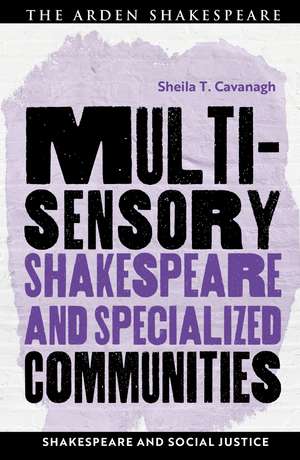Multisensory Shakespeare and Specialized Communities: Shakespeare and Social Justice
Autor Sheila T. Cavanagh Dr David Ruiter, Matthieu Chapmanen Limba Engleză Hardback – 7 feb 2024
Preț: 467.23 lei
Preț vechi: 646.14 lei
-28% Nou
Puncte Express: 701
Preț estimativ în valută:
89.43€ • 93.01$ • 74.94£
89.43€ • 93.01$ • 74.94£
Carte tipărită la comandă
Livrare economică 13-27 martie
Preluare comenzi: 021 569.72.76
Specificații
ISBN-13: 9781350296428
ISBN-10: 1350296422
Pagini: 288
Dimensiuni: 138 x 216 mm
Greutate: 0.48 kg
Editura: Bloomsbury Publishing
Colecția The Arden Shakespeare
Seria Shakespeare and Social Justice
Locul publicării:London, United Kingdom
ISBN-10: 1350296422
Pagini: 288
Dimensiuni: 138 x 216 mm
Greutate: 0.48 kg
Editura: Bloomsbury Publishing
Colecția The Arden Shakespeare
Seria Shakespeare and Social Justice
Locul publicării:London, United Kingdom
Caracteristici
The study is of relevance to several communities, including scholars, teachers, therapists, and arts practitioners
Notă biografică
Sheila T. Cavanagh is Professor of English at Emory University, USA, and Director of the World Shakespeare Project, which has brought her into contact with Shakespeareans around the globe. She has published widely in early modern literature, culture, pedagogy, and applied Shakespeare.
Cuprins
AcknowledgementsAbbreviationsIntroduction: 'The Five [or more] Best Senses' Chapter One. 'In Mine Own Throat': The Power of Breath and VoiceChapter Two: Hearing 'the Owl Shriek': Shakespearean SoundscapesChapter Three. 'Such Branches of Learning': Shakespeare and Learning DifferencesChapter Four. 'Touch of nature': Expanding Shakespearean Sensory PalatesChapter Five: 'Weight of pain': Trauma-informed Shakespeare for Veterans Chapter Six: 'The rich advantage of good exercise': Physicality, Art and Mindfulness In Prison ShakespeareChapter Seven: 'The Open Ear of Youth': Shakespeare through Physical and Expressive ArtsNotesBibliographyIndex
Recenzii
Sheila Cavanagh's book deftly collaborates and extends across borders: intellectual, disciplinary, sensory, institutional and geographic. Her scope is radically inclusive, and the specialized communities she discusses range widely in character and situation. What I admire about this research is its urgent social commitment, its clear-eyed view of cultural capital, and its creative and respectful partnership with theatre makers of all kinds. Cavanagh has an eye for the compelling anecdote or quotation that brings a context or individual to life, and her book is always alert to the irreducible individuality of the encounters she discusses. If you are sceptical about Shakespeare in such specialized settings (I think I was before reading this), Cavanagh's work, combining analysis with joy and academic insight with personal empathy, will persuade you to think again.
Sheila Cavanaugh is a unique voice in the Shakespeare world: she not only studies Shakespeare productions in every part of the globe, but in this new book she reveals the relevance of Shakespeare to include the most disenfranchised. This is an original, haunting book.
Sheila Cavanaugh is a unique voice in the Shakespeare world: she not only studies Shakespeare productions in every part of the globe, but in this new book she reveals the relevance of Shakespeare to include the most disenfranchised. This is an original, haunting book.

